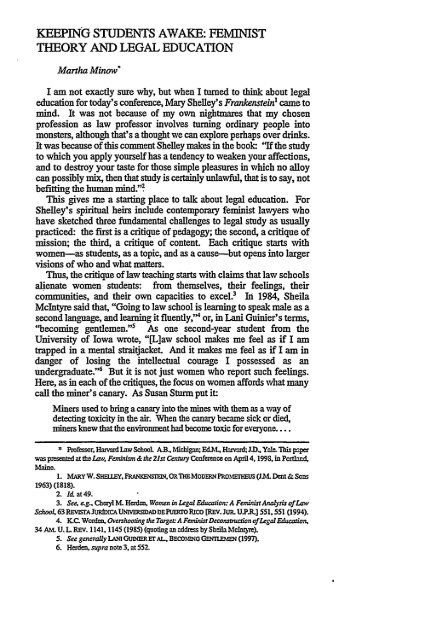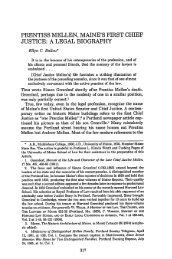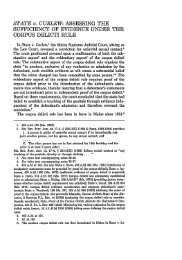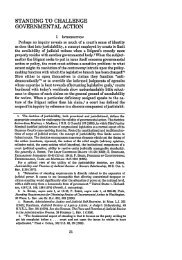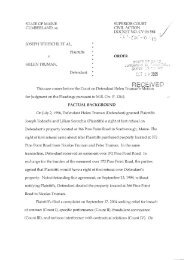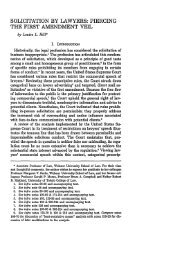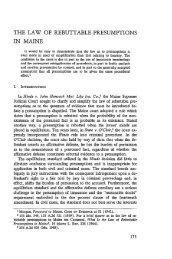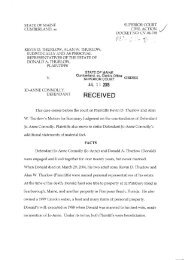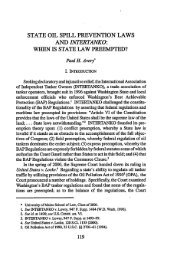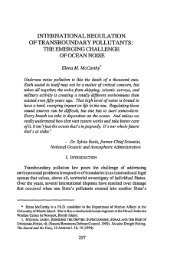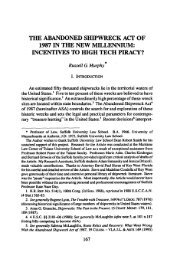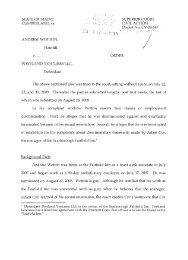Keeping Students Awake: Feminist Theory and Legal Education
Keeping Students Awake: Feminist Theory and Legal Education
Keeping Students Awake: Feminist Theory and Legal Education
Create successful ePaper yourself
Turn your PDF publications into a flip-book with our unique Google optimized e-Paper software.
KEEPING STUDENTS AWAKE: FEMINIST<br />
THEORY AND LEGAL EDUCATION<br />
Martha Minow"<br />
I am not exactly sure why, but when I turned to think about legal<br />
education for today's conference, Mary Shelley's Frankenstein' came to<br />
mind. It was not because of my own nightmares that my chosen<br />
profession as law professor involves turning ordinary people into<br />
monsters, although that's a thought we can explore perhaps over drinks.<br />
It was because of this comment Shelley makes in the book: "If the study<br />
to which you apply yourself has a tendency to weaken your affections,<br />
<strong>and</strong> to destroy your taste for those simple pleasures in which no alloy<br />
can possibly mix, then that study is certainly unlawful, that is to say, not<br />
befitting the human mind."<br />
This gives me a starting place to talk about legal education. For<br />
Shelley's spiritual heirs include contemporary feminist lawyers who<br />
have sketched three fundamental challenges to legal study as usually<br />
practiced: the first is a critique of pedagogy; the second, a critique of<br />
mission; the third, a critique of content. Each critique starts with<br />
women-as students, as a topic, <strong>and</strong> as a cause-but opens into larger<br />
visions of who <strong>and</strong> what matters.<br />
Thus, the critique of law teaching starts with claims that law schools<br />
alienate women students: from themselves, their feelings, their<br />
communities, <strong>and</strong> their own capacities to excel? In 1984, Sheila<br />
McIntyre said that, "Going to law school is learning to speak male as a<br />
second language, <strong>and</strong> learning it fluently," or, in Lani Guinier's terms,<br />
"becoming gentlemen ' As one second-year student from the<br />
University of Iowa wrote, "[L]aw school makes me feel as if I am<br />
trapped in a mental straitjacket. And it makes me feel as if I am in<br />
danger of losing the intellectual courage I possessed as an<br />
undergraduate." 6 But it is not just women who report such feelings.<br />
Here, as in each of the critiques, the focus on women affords what many<br />
call the miner's canary. As Susan Sturm put it:<br />
Miners used to bring a canary into the mines with them as a way of<br />
detecting toxicity in the air. When the canary became sick or died,<br />
miners knew that the environment had become toxic for everyone....<br />
* PRofe, Harvard Law School. AB. Michigan; Ed , Hfafrad; J.D., Yad. This pVr<br />
was peseted at tieLaw, Feminism &the 21st Cenahy Conference on April 4.1998. in Portl<strong>and</strong>,<br />
Maine.<br />
1. MARY W. SLEY, RWOEN , ORTtmMODE NPRO.Nar (J.M. Dent & Sow<br />
1963) (1818).<br />
2. Id. at 49.<br />
3. See, e.g., Cheryl M. Herden, Women in <strong>Legal</strong> <strong>Education</strong>: A <strong>Feminist</strong>Analysis of Law<br />
School, 63 REVisTAJURtDICAUNMVERSMAD DERaO RICO [REV. JUR. U.P.R.] 551.551 (1994).<br />
4. K.C. Warden, Overshooting the Target.A <strong>Feminist</strong> Deconstucton of <strong>Legal</strong>FEducat'on,<br />
34 AM. U. L REV. 1141, 1145 (1985) (quoting an address by Sheila Mcint)re).<br />
5. See generally LAM GUREEr AL.., BECOMG GemMEEN (1997).<br />
6. Herden, supra note 3, at 552.
MAINE LAW REVIEW<br />
[Vol. 50:337<br />
The experience of women <strong>and</strong> other previously excluded people can<br />
provide an angle of vision enabling the transformation of legal<br />
education to prepare lawyers <strong>and</strong> law for the twenty-first century.<br />
Lani Guinier <strong>and</strong> her co-authors, Michelle Fine <strong>and</strong> Jane Balin,<br />
quickly explain in their report on a study of the University of<br />
Pennsylvania Law School that it is not just women who never or rarely<br />
participate in class, lose confidence, voice, aspirations, <strong>and</strong> the ability<br />
to achieve. The competitive, adversarial environment, the reliance on<br />
quick, disjointed verbal comments <strong>and</strong> one-time written exams, <strong>and</strong> the<br />
problems abstracted from context, persons, <strong>and</strong> purposes impair the<br />
learning opportunities for many men as well.<br />
For feminist critics, legal pedagogy should promote listening as well<br />
as talking <strong>and</strong> collaboration as well as individual excellence. Teachers<br />
should call not on the first or second-h<strong>and</strong> up, but instead on a h<strong>and</strong><br />
raised after most h<strong>and</strong>s in the classroom are up. <strong>Students</strong> should have<br />
many occasions to work in groups, in <strong>and</strong> out of class. More basically,<br />
recognition that students come with learning styles should guide<br />
instruction.<br />
The second, related critique challenges the implicit mission of law<br />
schools of training litigators <strong>and</strong> hired guns. Instead, or in addition, law<br />
schools should train problem-solvers: civil leaders, <strong>and</strong> activists able to<br />
advance social movements, rather than individuals willing to serve only<br />
the highest bidder. To be problem-solvers, students must learn to be<br />
listeners, <strong>and</strong> to be able to underst<strong>and</strong> multiple viewpoints. In her<br />
disability law class, Professor Taunya Banks requires her students to<br />
spend several hours trying to maneuver around the law school using a<br />
wheelchair.' <strong>Legal</strong> education should enlarge students' capacities for<br />
empathy <strong>and</strong> appreciation of the perspectives of others so that they can<br />
be lawyers with those abilities. Obviously this critique <strong>and</strong> vision<br />
extend beyond women to all students <strong>and</strong> lawyers.<br />
The third critique looks directly at the content of legal education.<br />
What demeans women or relies on gender stereotypes must change.<br />
Mary Joe Frug's classic critique of a st<strong>and</strong>ard contracts casebook may<br />
not have excised the gender stereotypes but the casebook has<br />
changed-<strong>and</strong> her article now joins the canon of first year readings. 9<br />
Equally important as sins of commission, though, are sins of omission:<br />
the historical exclusion of topics of concern to women from the law<br />
school curriculum <strong>and</strong> the continuing devaluation of perspectives <strong>and</strong><br />
concerns held by women. By now, much of this critique seems antique.<br />
Rape is taught in criminal law; sexual harassment <strong>and</strong> sex discrimination<br />
appear in civil procedure <strong>and</strong> torts classes as well as gender<br />
7. Susan P. Sturm From Gladiators to Problem-Solvers: Connecting Conversations About<br />
Women, the Academy, <strong>and</strong> the <strong>Legal</strong> Profession, 4 DUKE J. GENDER L & POL'Y 119, 126 (1997).<br />
8. See Herden, supra note 3, at 567.<br />
9. See generally Mary Joe Frug, Rereading Contracts: A <strong>Feminist</strong>Analysis of a Contracts<br />
Casebook, 34 AM. U. L REV. 1065 (1984).
1998]<br />
KEEPING STUDENTS AWAKE<br />
discrimination courses. <strong>Feminist</strong> scholarship proliferates. You've heard<br />
about excellent examples at this conference. And these ideas make their<br />
way into not just gender, <strong>and</strong> family law, but also courses in contracts,<br />
tax, <strong>and</strong> bankruptcy. Still, though, often omitted from legal education<br />
are strategies of feminist argument such as narrative <strong>and</strong> consciousnessraising.<br />
Yet even to talk in these terms is to run directly into a debate among<br />
feminists: what strategies do all feminists adopt, <strong>and</strong> what are<br />
distinctively feminist approaches? Is mediation a feminist problemsolving<br />
approach or an innovation that hurts women? Is narrative<br />
advanced by feminists any different than narrative advanced by critical<br />
race scholars? Do feminist narratives battle subordination in any special<br />
ways? These questions can be shunted aside if we resist desires for<br />
exclusivity; it shouldn't matter if others besides feminists want particular<br />
content to change. But the divisions among feminists about content does<br />
render the relevance of feminism to legal education more problematic.<br />
<strong>Feminist</strong> legal theory actually has a positive program in the area of<br />
legal education, <strong>and</strong> one that can <strong>and</strong> should inspire coalitions for<br />
change. Yet, at times, feminism's own internal divisions make this<br />
claim difficult to comprehend, much less advance.<br />
Perhaps the greatest hope here is opponents. Opponents who raise<br />
objections to feminist legal scholarship <strong>and</strong> teaching give us two<br />
wonderful gifts. The first is essentially a certificate of influence. Only<br />
if we are threatening enough would we warrant opponents. The second<br />
is the possibility of renewed unity. If feminists engage in debate with<br />
opponents, we may help to clarify what we are for <strong>and</strong> what we are not<br />
about.<br />
Here I think we could start by trying to identify common themes in the<br />
work already underway. In the three critiques of legal education, the<br />
starting point may have been asking the "woman question," but that is<br />
not what holds them together now. Instead, I suggest one basic theme<br />
is resistance to the assumption that human beings are <strong>and</strong> should be<br />
fundamentally separate, self-interested, <strong>and</strong> competitive. That<br />
assumption renders typical pedagogy impoverished. It shrinks the<br />
potential mission of law schools to the production of self-interested<br />
litigators. It narrows the content of law school classes. In contrast,<br />
feminists juxtapose the assumption of human separation <strong>and</strong> selfishness<br />
with the facts of humnn interdependence. This interdependence is often<br />
laden with hierarchies of domination <strong>and</strong> subordination, but only if<br />
human connections are at the center can these patterns in all their<br />
persistence be seen. Interdependence itself is not the problem; instead,<br />
it is a wellspring of potential resistance <strong>and</strong> sustenance.<br />
We each know how much we depend on others to get by, get through,<br />
<strong>and</strong> even to get up. Perhaps you already know the research findings<br />
highlighting the relationship between health <strong>and</strong> social supports through<br />
family <strong>and</strong> friends. A town noted for having less than fifty percent of<br />
the national average rate for heart attacks is also characterized by
340<br />
MAINE LA W REVIEW<br />
[Vol. 50:337<br />
closely-knit family <strong>and</strong> community relations.' 0 Couples get fewer<br />
illnesses <strong>and</strong> live longer than their single counterparts." One study<br />
found that most of a group of 275 sudden deaths of older persons<br />
followed a traumatic disruption of a close human relationship or the<br />
anniversary of the loss of a loved one.' 2 Membership in networks of<br />
close friends <strong>and</strong> family seems to reduce risks of mental illness.' 3<br />
People offer emotional support to one another that buffers against the<br />
stresses of life. Emotional support also offers a sense of meaning,<br />
purpose, <strong>and</strong> value. Studies, in short, confirm what my gr<strong>and</strong>mother,<br />
<strong>and</strong> the lyrics from Funny Gir4 taught me. People need people. Yet<br />
people also misuse <strong>and</strong> hurt others. How can connections be safe <strong>and</strong><br />
fair?<br />
If this were the starting point, law schools would spend as much time<br />
on duties as rights, <strong>and</strong> as much time on consumer protection as freedom<br />
of contract. Human interdependence certainly characterizes the practice<br />
of law. You know the old story about the one-lawyer town, not too far<br />
from here? A newcomer arrived <strong>and</strong> hung out a shingle to practice. A<br />
friend asked the formerly solitary lawyer, "Aren't you worried? There<br />
wasn't enough business for you before <strong>and</strong> now you have competition."<br />
"Why no," replied the first lawyer, "Now we'll both have plenty of<br />
business.".<br />
An adversary system needs adversaries. It also needs clerks,<br />
paralegals, magistrates, computer technicians, accountants, librarians,<br />
forensic scientists, police, bailiffs, <strong>and</strong> managers. Of course lawyers<br />
need clients as much as clients need lawyers. But what perhaps goes<br />
without enough attention is how much lawyers need membership in<br />
circles of associates <strong>and</strong> friends. Working with other lawyers-on the<br />
same side or across the table-is what most lawyers (but not most law<br />
students) do. The quality of those relationships makes all the difference<br />
to a lawyer's ability to be a problem-solver rather than a problemdeepener.<br />
In addition, colleagues <strong>and</strong> friends are often all that st<strong>and</strong><br />
between a lawyer <strong>and</strong> ethical disaster. Once we concede that legal ethics<br />
should be something other than an oxymoron, we come to the first rule<br />
of legal ethics: never resolve an ethical problem without talking it over<br />
with someone you trust.<br />
The interdependence lawyers have with one another is second in<br />
importance only to a more profound cultural interdependence. People<br />
these days call it civil society: the patterns of association <strong>and</strong> mutual aid<br />
that connect people in groups larger than households <strong>and</strong> smaller than<br />
the entire world, or country. The United States has had a particularly<br />
vital civil society, being as we are a nation of joiners <strong>and</strong> volunteers. It<br />
10. See MARK PiuSK & SUSAN HILIERPARKS, THE HEALING WED: SoIALNErwoRKs<br />
AND HUMAN SURVIVAL 32 (1986) (describing a study published in 1964 in the Journal of the<br />
American MedicalAssociation which examined a small community).<br />
11. See id. at 33.<br />
12. See idL (describing a study published in 1977 in Psychology Today).<br />
13. See id at 36.
1998]<br />
KEEPING STUDENTS AWAKE<br />
is the Women's Bar Association, the Big Brothers clubs, the NAACP,<br />
the League of Women Voters, the church choir, the grassroots<br />
community organization, the battered women's shelter-<strong>and</strong> countless<br />
others--that draw the talents <strong>and</strong> energy of people to make things better.<br />
Political theorist Robert Putnam calls the results "social<br />
capital" 4 -meaning the resources that come when people rub shoulders<br />
with others outside their immediate circles <strong>and</strong> learn to care for one<br />
another. I do have to laugh a bit; lots of us have talked <strong>and</strong> worried<br />
about this without giving it an economic name like "social capital," but<br />
that very name has arrested attention from leaders here <strong>and</strong> around the<br />
world. Putnam is the one who warns we have declining social capital;<br />
rather than bowling in leagues, for example, he says Amricans are more<br />
<strong>and</strong> more "bowling alone." The result, he says, is erosion of the crucial<br />
materials for democracy. 6 People feel less connected to larger<br />
communities <strong>and</strong> issues, so they do not vote or otherwise participate in<br />
self-governance. 17 And when they do, it is with an attitude of private<br />
consumption: asking "what will be good for meT" rather than "what will<br />
be good for all of us?" There is a bit too much nostalgia for what<br />
probably never existed in all this for my taste, but also some important<br />
ideas. Putnam studied towns in Italy where self-governance worked <strong>and</strong><br />
compared them with towns where democracy failed.' The crucial<br />
difference, he concluded, was the traditions of informal organizations,<br />
choirs, <strong>and</strong> the like in the towns where democracy worked." These<br />
activities created social capital by helping people relate to people unlike<br />
themselves.<br />
Now, social capital does not appear in the GNP or other economic<br />
measures. It is precisely the set of social relationships that usually st<strong>and</strong><br />
apart from legal regulation. Yet for lawyers, specifically, declines in<br />
social capital pose serious dangers. We who use words to promote<br />
transactions <strong>and</strong> solve problems, to push for changes in the workplace,<br />
schools, <strong>and</strong> the entire society, depend upon the crisscrossing networks<br />
of civil society. Distrust, disorder, <strong>and</strong> potentially explosive violence by<br />
both private <strong>and</strong> public actors endanger what we do <strong>and</strong> also undermine<br />
any vision of the good life.<br />
It may be clever to appropriate the language of economics to talk<br />
about interdependence, but that move carries with it two dangers. The<br />
first is obscuring the patterns of power <strong>and</strong> exclusion that can operate<br />
through associations <strong>and</strong> human connection; the second is entering into,<br />
rather than critiquing, the economic language sweeping through law<br />
14. See Robert D. Putnam, Bowling Alone: America's Declining Social Capital, 6 1.<br />
DEMOCRACY 65,66 (1995) (credifing James S. Co!eman).<br />
15. See id. at 70.<br />
16. Seeid at77.<br />
17. See id. at 67-68.<br />
18. See id. at 66 (citing ROBERT D. PU'NAM, IdAING DEMOCRACY WORK: vic<br />
TRAmoNs iN MODERN ITALY (1993)).<br />
19. See id.
342 MAINE LAW REVIEW [Vol. 50:337<br />
schools <strong>and</strong> the larger society. The dominant discourse of economic<br />
necessity <strong>and</strong> market choice risks squeezing out the equally important<br />
language of responsibility, care, equality, fairness, <strong>and</strong> compassion.<br />
Engendering this alternative language is something law schools could<br />
do, especially if informed by feminist work. We cannot cede to the<br />
economists, the corporations, <strong>and</strong> tax classes any more than the worlds<br />
they address. <strong>Students</strong> also need to underst<strong>and</strong> that attention only to<br />
time sheets <strong>and</strong> cost-effectiveness leads to slighting the human<br />
interactions that are the soil we all need to survive.<br />
Lawyers have the opportunity to express <strong>and</strong> sustain another set of<br />
values: the values of fairness <strong>and</strong> duty, civility <strong>and</strong> community, reliance<br />
<strong>and</strong> justice. These values are seldom captured, <strong>and</strong> sometimes<br />
undermined, by bottom-line thinking <strong>and</strong> efficiency concerns. Yet these<br />
values historically represented crucial contributions of law to society.<br />
Now, law schools are themselves often taken over by the economists'<br />
world view, <strong>and</strong> it is not even a hostile takeover.<br />
Treating lawyers as especially attuned to the values of interdependence<br />
may seem odd given the feminist critiques of adversariness <strong>and</strong><br />
the assumption of selfish, autonomous individualism in American law.<br />
Yet feminist legal theories do show <strong>and</strong> revitalize the traditions already<br />
present in law. Dare I say it: the "j" word-justice. Justice fundamentally<br />
attends to our interdependence as moral beings. <strong>Feminist</strong>s can<br />
be the miner's canary in law schools <strong>and</strong> law firms, in community<br />
organizations, <strong>and</strong> in the political scene by exposing how little talk there<br />
is ofjustice. Indeed, if we don't hear the 'j" word in the corridors of our<br />
workplaces, with our neighbors, in classrooms, in political discussions,<br />
<strong>and</strong> in talk of the global economy-it is partly our job to ask: "What<br />
aboutjustice?" It is also our job to ask: 'What will replenish the sense<br />
of community <strong>and</strong> interdependence as factories, executives, workers, <strong>and</strong><br />
capital move across enterprises, <strong>and</strong> across borders, with no time or<br />
continuity to cultivate human relationships or sustain the security that<br />
allows people to challenge exploitation?"<br />
As I gathered my thoughts for today, I talked with Brenda Cossman,<br />
a law professor in Canada. I asked, 'What would you say to a<br />
conference about the relevance of feminism to legal education?" She<br />
answered with bell hooks's marvelous phrase, "from margin to center."<br />
And indeed, in Canada, already, feminism is a mainstream subject,<br />
approach, <strong>and</strong> mission in legal education. Some forms of feminism are<br />
also pervasive in law schools in Norway, Denmark, Australia, the<br />
Netherl<strong>and</strong>s, <strong>and</strong> parts of Britain <strong>and</strong> South Africa. Comparative<br />
projects may be all the rage now---excuses to travel?-but it does seem<br />
a fascinating <strong>and</strong> crucial question to underst<strong>and</strong> when <strong>and</strong> how feminist<br />
ideas affect legal education in different countries. How do the<br />
differences in the laws <strong>and</strong> legal cultures influence the reception of<br />
feminist ideas? How do different feminisms fare? Yet, more than<br />
20. See BELL HOOKS, FMlISr TmEORY: FRoM MARGIN TO CENTER (1984).
19981<br />
KEEPING STUDENTS AWAKE<br />
fascinating, these sprouting feminisms around the world could be the<br />
bases for a global challenge to the global forces that threaten<br />
interdependence, justice, <strong>and</strong> respect for human beings. The creativity<br />
manifested in a conference like today's is exploding elsewhere, too. Can<br />
we join together?<br />
That extraordinary woman of dance, Agnes de Mille, once said, "I<br />
learned three important things in college-to use a library, to memorize<br />
quickly <strong>and</strong> visually, to drop asleep at any time given a horizontal<br />
surface <strong>and</strong> fifteen minutes." 21 Law school adds the ability to drop<br />
asleep at any given time even while sitting. Feminism, I think, can keep<br />
students awake, <strong>and</strong> alert to both what is monstrous in our midst, <strong>and</strong><br />
what we ourselves can work to change.<br />
21. AGNESDEMIz, DANCETO MPE PzR90 (1952). She added. "Vh= I could not lear<br />
was to think creatively on schedule." ML


